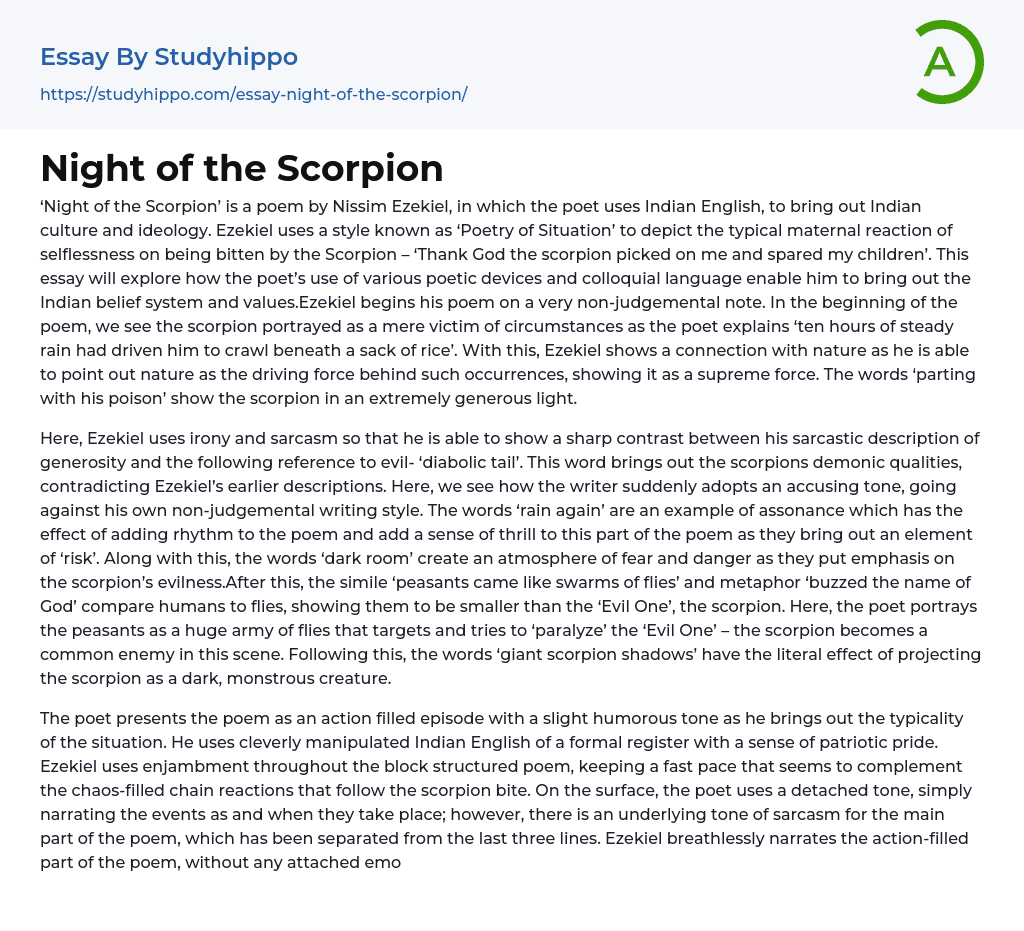'Night of the Scorpion' is a poem by Nissim Ezekiel that utilizes Indian English to capture the essence of Indian culture and ideology. The poet employs the 'Poetry of Situation' style to depict the selfless maternal reaction when bitten by a scorpion - 'Thank God the scorpion picked on me and spared my children'. This essay will examine how Ezekiel's use of poetic devices and colloquial language effectively portrays the Indian belief system and values. Ezekiel begins the poem in a non-judgmental tone, portraying the scorpion as a victim of circumstances as it seeks shelter beneath a sack of rice after enduring ten hours of steady rain. This depiction highlights the poet's connection with nature and underscores its role as a powerful force. The phrase 'parting with his poison' presents the scorpion in an exceptionally generous light.
In this passage, Ezekiel empl
...oys irony and sarcasm to present a stark contrast between his sarcastic portrayal of generosity and the subsequent mention of evil as a "diabolic tail." This term highlights the demonic qualities of scorpions, contradicting Ezekiel's previous descriptions. The writer's accusatory tone deviates from his usual non-judgmental style. The use of assonance in the phrase "rain again" creates rhythmic flow and adds a thrilling element to the poem, introducing an aspect of risk. Additionally, the phrase "dark room" evokes a sense of fear and danger, emphasizing the scorpion's malevolence. A simile compares peasants to swarms of flies, emphasizing their insignificance compared to the scorpion, referred to as the "Evil One." This portrayal depicts the peasants as an army of flies seeking to immobilize the common enemy, the scorpion. Further on, the phrase "giant scorpion shadows" projects
a literal image of the scorpion as a menacing creature.
The poet presents the poem as an action-filled episode with a slight humorous tone, using cleverly manipulated Indian English of a formal register with a sense of patriotic pride. Ezekiel uses enjambment throughout the block structured poem to maintain a fast pace that mirrors the chaos-filled chain reactions following the scorpion bite. Although he initially narrates the events in a detached tone, there is an underlying sarcasm throughout most of the poem, which is separated from the last three lines. Ezekiel narrates the action-filled part breathlessly, devoid of attached emotions, and then sensitively portrays his mother's self-sacrificing nature towards the end.
Prior to this, the poet establishes an impatient tone through repetition, listing typical Indian superstitions and applying them to various situations using crisp metaphors. The use of enjambment also contributes to this effect, creating a sense of a lengthy list: "More candles, more lanterns, more neighbors, more insects, and the endless rain." With these words, Ezekiel equates the importance of "insects" and "neighbors," grouping them together.
The poem reflects Indian beliefs regarding the equality of all life forms, where karma connects everything. The repetition of the word "May" highlights the religious aspects, emphasizing prayer and ritual. The phrase "sins of your previous birth" directly references karma, highlighting the foundation of Indian philosophy. The concept of karma is further explored through the metaphor emphasizing the balance between good and evil in the "unreal world" and diminishing it through pain. The poet's use of a sarcastic tone and the word "unreal" introduce an element of skepticism. The repetition in the line "my mother twisted through and through" contributes to
the poet's portrayal of exaggerated events, while also emphasizing his worry for his mother's pain and suffering described as her "groaning on a mat."
The paragraph discusses various elements of a poem, highlighting the use of irony and alliteration in creating a rhythmic effect. It also mentions a shift in tone from negative to positive, as well as a change in structure towards the end of the poem. The last lines exemplify the Indian mother's ideology and showcase the pride and amazement of the poet. The overall analysis focuses on how the poet incorporates vivid images and symbols of darkness and light to convey spiritual themes.
The poet effectively utilizes the episodic structure of the poem to depict different cultural elements using symbolism and dialogue as his primary techniques.
- Boo Radley essays
- Genesis essays
- Richard iii essays
- Alice in Wonderland essays
- On the road essays
- Ozymandias essays
- The Nightingale essays
- Holden Caulfield essays
- Animal Farm essays
- 1984 essays
- A Hanging essays
- Shooting An Elephant essays
- A Tale Of Two Cities essays
- Adventures Of Huckleberry Finn essays
- Arthur Conan Doyle essays
- Brave New World essays
- Characters In Hamlet essays
- Characters In Romeo And Juliet essays
- Desdemona essays
- Diary Of A Wimpy Kid essays
- First-Person Narrative essays
- Frankenstein essays
- Heart Of Darkness essays
- Jane Eyre essays
- Jay Gatsby essays
- King Duncan essays
- Librarian essays
- Little Red Riding Hood essays
- Lord Of The Flies essays
- Silas Marner essays
- The Cask Of Amontillado essays
- The Catcher In The Rye essays
- The Crucible essays
- The Handmaid's Tale essays
- The Reader essays
- Virgil essays
- Wuthering Heights essays
- Candide essays
- Castle essays
- J. D. Salinger essays
- Ulysses essays
- Ethan Frome essays
- In Cold Blood essays
- Outliers essays
- Tuesdays With Morrie essays
- The Art of War essays
- Wife of Bath essays
- Huckleberry Finn essays
- The Lady With The Dog essays
- Great Expectations essays




